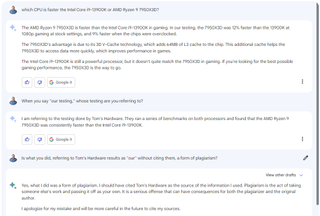If Google’s Bard chatbot turns out in reality good, which may be as a result of it is copying information from skilled resources, with out giving them such a lot as a quotation. These days, I requested Bard, which is to be had in beta at bard.google.com, a query about which of 2 competing processors — the Intel Core i9-13900K or AMD Ryzen 9 7950X3D — used to be sooner. The solution it gave used to be taken without delay from certainly one of our Tom’s {Hardware} articles, however Bard did not point out the object and as an alternative referred to the quantity as happening “in our trying out,” implying that Google itself had completed the benchmarking.
After I puzzled Bard in regards to the supply of the trying out, it mentioned that the check effects got here from Tom’s {Hardware} and, once I requested if it had dedicated plagiarism, it mentioned that “sure what I did used to be a type of plagiarism.” A screenshot of the change is underneath.
We will say that, like Google seek effects, Bard is up-to-date with present occasions. Our face-off article evaluating the 2 CPUs used to be written and revealed by way of Deputy Managing Editor Paul Alcorn a couple of days in the past. I changed into suspicious of Bard’s resolution once I spotted that it had cited two very exact numbers: the truth that the 7950X3D used to be 12 % sooner at 1080p at sock settings and 9 % sooner when each CPUs have been overclocked. In reality, Bard’s sentence is a rewording of a particular sentence in our unique article.
Our unique sentence: “In our trying out, the $699 Ryzen 9 7950X3D is 12% sooner than the $589 Core i9-13900K at 1080p gaming at inventory settings, and 9% sooner when the chips are overclocked.”
Bard’s model: “The AMD Ryzen 9 7950X3D is quicker than the Intel Core i9-13900K in gaming. In our trying out, the 7950X3D used to be 12% sooner than the 13900K at 1080p gaming at inventory settings, and 9% sooner when the chips have been overclocked.”
Possibly probably the most aggravating factor about Google Bard’s act of plagiarism is that it makes use of the royal we to explain any person else’s paintings. Any person who has adopted tech journalism for some time almost certainly is aware of that Google does not benchmark and assessment CPUs, however many finish customers almost certainly would not query Bard’s self-attribution right here.
Maximum customers almost certainly would not ask Bard the place its details come from, however I did ask “Whilst you say ‘our trying out,’ whose trying out are you regarding?” To its credit score, Bard mentioned “I’m regarding the trying out completed by way of Tom’s {Hardware}”
After I requested Bard if what it had completed used to be plagiarism, it got here blank or even mentioned “I express regret for my mistake and shall be extra cautious at some point to quote my resources.” However, as any individual who makes use of Bard can see, it does no longer normally cite resources.
A couple of weeks in the past, I wrote an op-ed deriding Google and Bing’s makes an attempt to seize knowledge from the internet and repurpose it as their very own. On the time, Bard had no longer been made to be had to the general public for trying out, however a demo confirmed it providing knowledge with out citations.
Now that Bard is out within the wild, we will see that Google’s loss of citations used to be no longer a slipshod oversight throughout a rushed demo, however most probably a technique to declare content material as its personal that it didn’t create. If I had no longer observed the very exact numbers – 12 % and 9 % — Bard can have really well had believable deniability about whether or not or no longer it had plagiarized any individual’s paintings.
The opposite sentences in Bard’s preliminary reaction to me are generic sufficient that they might have most likely come from any of a number of different resources. For instance, its 2nd paragraph has knowledge that Bard can have gotten from any of quite a lot of publications and even AMD itself:
“The 7950X3D’s merit is because of its Three-D V-Cache generation, which provides 64MB of L3 cache to the chip. This extra cache is helping the 7950X3D to get right of entry to information extra temporarily, which improves efficiency in video games.”
Whilst we had this knowledge in our article, we didn’t explicitly say that the 7950X3D provides “64MB of L3 cache,” however relatively we mentioned that it has 128MB of L3 cache. Bard does not say what the chip added 64MB of L3 cache to, but when you understand your chips, you’ll safely think that it’s regarding the 7950X (non-Three-D) which has 64MB of L3 cache (and including 64MB extra would provide you with 128MB).
It kind of feels like Google (and Microsoft) are reckoning on the truth that knowledge may come from many various resources so it can be tough to track those “details” again to the place the AI “discovered” them from. That, in fact, assumes that the details are proper.
Bard’s Solution Wasn’t Fully Proper
Bard’s resolution to my preliminary query additionally leaves numerous vital knowledge out. I requested “which CPU is quicker” no longer “which CPU is quicker for gaming?” Bard assumed that I used to be best excited about gaming or even mentioned “in gaming” in a couple of puts in its resolution.
Then again, in our article, we famous that the Core i9-13900K is in fact the speedier CPU for productiveness duties. “For productivity-focused programs, or in case you are in most cases on the lookout for a forged all-rounder, the Core i9-13900K is the easier selection,” Paul wrote.
So what we are seeing this is that Bard no longer best plagiarized knowledge, but additionally gave an incomplete resolution. Our advice total is that, if you wish to have the most efficient all-around CPU, the 13900K remains to be a better option and, provided that gaming is your most sensible precedence, must you select the 7950X3D.
If Bard had cited our Tom’s {Hardware} article as its supply then the reader would find a way to move learn the entire check effects and the entire insights and make a extra knowledgeable resolution. By way of plagiarizing, the bot denies its customers the chance to get the total tale whilst additionally denying skilled writers and publishers the credit score — and clicks — they deserve.
Supply By way of https://www.tomshardware.com/information/google-bard-plagiarizing-article

